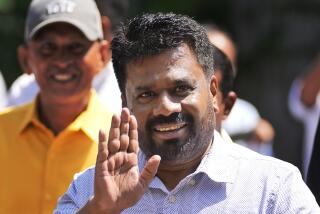Rao Named India’s 9th Prime Minister : Politics: He is a compromise choice by the Congress-I Party. He will be sworn in today.
- Share via
NEW DELHI — With a show of hands and a deafening thump of their table tops, members of India’s long-ruling Congress-I Party on Thursday unanimously elected P. V. Narasimha Rao, an aging, scholarly compromise candidate, to serve as India’s ninth prime minister.
The selection of Rao brings to a close the most traumatic chapter in India’s politics, which included last month’s assassination of former Prime Minister Rajiv Gandhi.
After the rubber-stamp vote, Rao, a veteran lawmaker fiercely loyal to Congress-I and the family that led it for three generations, presented himself Thursday night to India’s ceremonial president, Ramasawami Venkataraman, who will officially swear him in today as head of a minority government. The president gave Rao four weeks to form a government and win a confidence vote in Parliament.
“I accept this onerous responsibility, which you so kindly placed on my shoulders, because I know I have the full support of millions of shoulders in this country,” declared the short and frail Rao, addressing his party members in the Central Hall of Parliament.
With a yellow silk shawl draped over his narrow shoulders, the new leader, who underwent open-heart surgery a year ago and will turn 70 next week, noted his party’s failure to win a majority in the national elections, which gave the Congress-I just over 220 seats in the 545-member Parliament.
“We have scored 99. We should have scored 100,” he declared both in English and in Hindi, the national language. “But you cannot say we have not scored.
“The trend of the people is clear. . . . And now, with this strength, we shall run the government--and run the government successfully.”
Rao, who has a reputation for consensus-building and diplomacy, said his government will adhere strictly to the centrist manifesto that Gandhi and other party leaders had drafted before the former prime minister was killed by a bomb at a May 21 election rally.
The party’s ceremony dragged on for nearly two hours inside the Parliament’s steamy rotunda. And, as speaker after speaker representing most of India’s 22 states added their praise to the selection of Rao, the meeting itself reflected the autocratic quirks in the Congress-I Party’s traditional brand of democracy.
In fact, there was no contest and no real vote on the nation’s new prime minister, who was not among those elected to office in the recent legislative elections and who must now stand for election in a “makeup” vote somewhere in the country within six months.
Rather, Rao’s selection was made behind closed doors earlier in the day, after the other prime contender, Bombay industrialist and regional power broker Sharad Pawar, dropped a demand that the party’s newly elected legislators select their new president by secret ballot.
In the end, Pawar was pressured into accepting Congress-I’s longstanding rubber-stamp “consensus” method of leadership selection by party elders who convinced him that pressing the issue would split the nation’s largest party at a time of unprecedented national strife.
“We have forgotten our differences and elected our leader unanimously,” Pawar, 50, said Thursday evening in a speech praising Rao’s selection as party president and, by extension, prime minister.
“He can keep the country together, and the party together. . . . We’ll support him fully to strengthen the Congress Party and to fulfill the party’s promises.”
Most analysts are not so certain. Rao takes the nation’s helm when it is rent by violent secessionist movements in three key border states. And the election campaign of the Hindu-revivalist Bharatiya Janata Party--now the largest opposition force, with more than 120 parliamentary seats--deepened divisions between the nation’s 700 million Hindus and its Muslim minority of 100 million.
More to Read
Sign up for Essential California
The most important California stories and recommendations in your inbox every morning.
You may occasionally receive promotional content from the Los Angeles Times.












